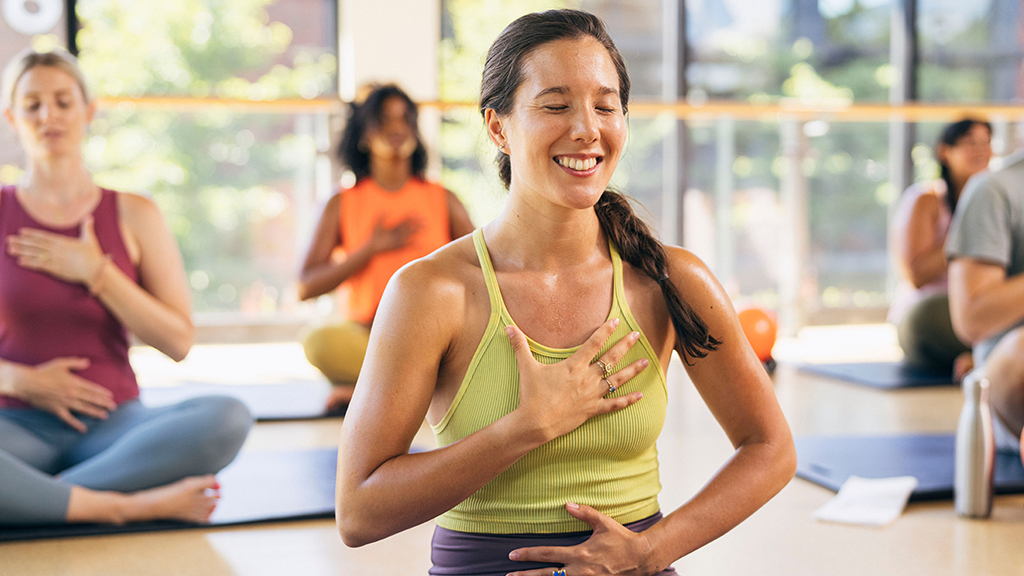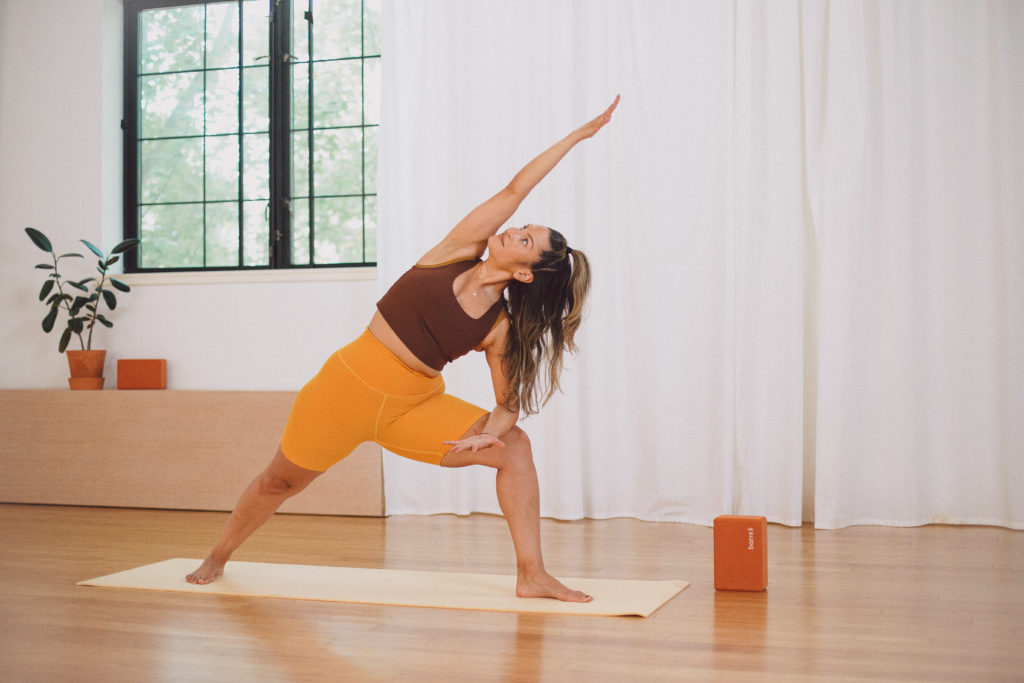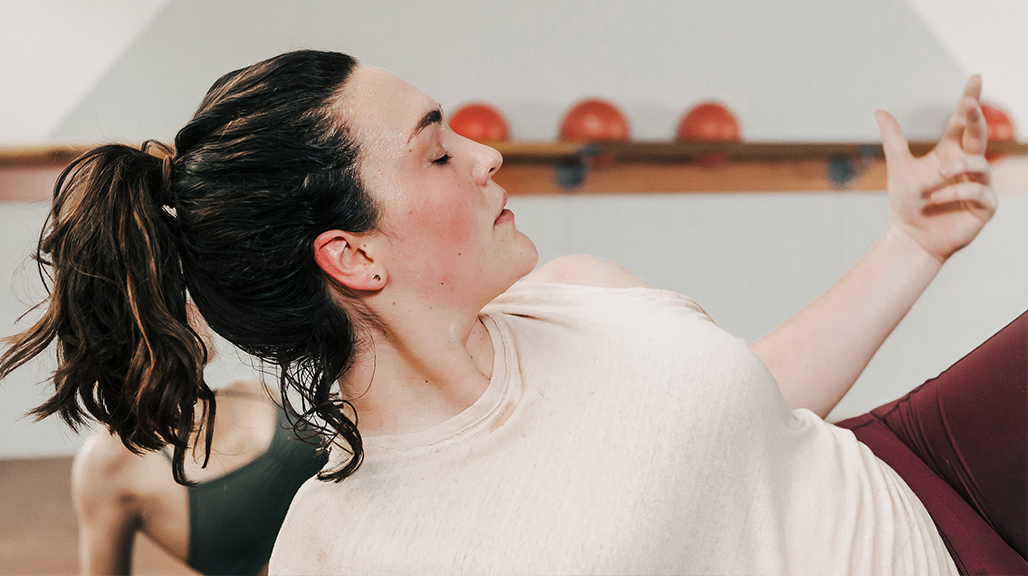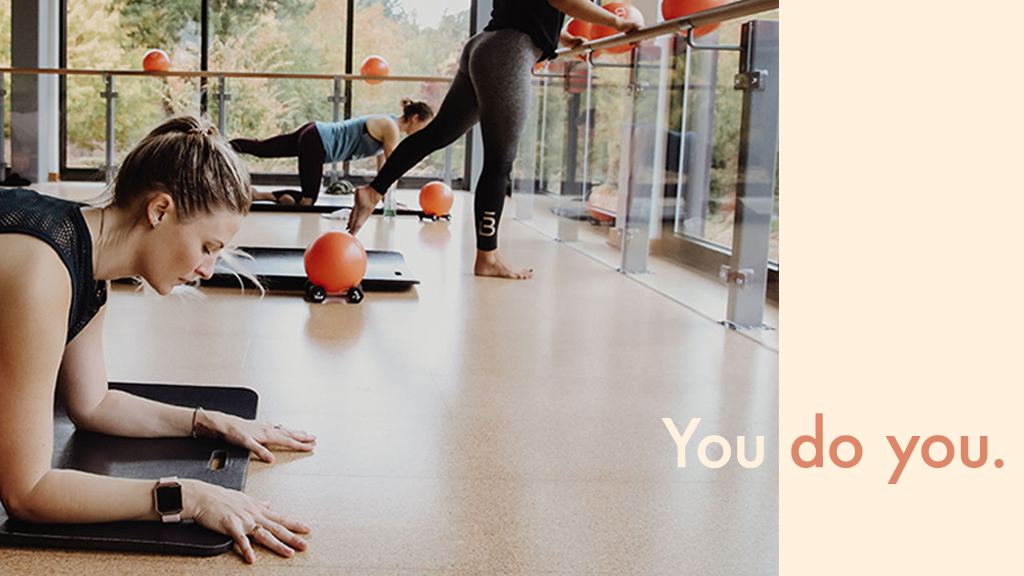Move
The Research Is In: Barre3 Boosts Self-Compassion
When Kayla Hamel first tried barre3, she noticed something different—both in the workout and in her mindset. “I’ve always been harsh with myself, thinking I should be doing more, and punishing myself if I felt I didn’t do enough—which was pretty much always,” she explains. “I noticed a difference after coming to barre3. Instead of punishing myself, I was saying things like, ‘You’ve worked really hard. You can take a break. It’s OK.’”
A Ph.D. student in Clinical Psychology, Kayla couldn’t help but wonder if her experience was unique or if there was something larger going on. “I talked to a few other clients and found that they had noticed something similar,” she says. So, like any good researcher would, she conducted a study to investigate the effect of barre3 classes on mental health and self-compassion. “It is pretty neat because it highlights the psychological benefits of barre3 classes, specifically on self-compassion,” Kayla says.
The study was published in the International Journal of Sports and Exercise Psychology in June 2020, and we recently had the chance to catch up with Kayla to learn more about it. Read on to learn about how she conducted the study, what she found, and how those findings could help our society expand how we think about exercise.
BARRE3 MAGAZINE: I’m so fascinated by your study, but before we dig into the nuts and bolts of it, can you fill us in on how you got it off the ground?
KAYLA: I was a barre3 client for a couple years when Aimee, the studio owner at the barre3 Toronto studios, approached me and asked if I’d like to be an instructor. I said, “Yes…and I have a study I’d like to do.” I was particularly interested in studying how barre3 classes influenced the development of self-compassion, which is the ability to be aware of your suffering, to treat yourself with kindness, and to recognize the common humanity in your struggles.
I went through instructor training and got certified, and a little while later I talked with Aimee about the study idea in more detail. She was all for it, so I spoke to my advisors, wrote a proposal, and got it approved by the university’s research ethics office.
BARRE3 MAGAZINE: Can you walk us through what you were looking at, specifically?
KAYLA: To start, I did a lot of research in two main areas linked to mental health: exercise and self-compassion. I was interested in how those came together. Research evidence is accumulating to show the importance of self-compassion in healthy psychological functioning, though I have not really seen research looking at this in the context of physical activity. Most studies I had come across looked at one or the other, but I wanted to understand how they functioned together.
BARRE3 MAGAZINE: You make such a good point—we see so many studies that show exercise is good for your mental health, but I’ve never seen a study that brought in the self-compassion element.
KAYLA: I was hypothesizing that barre3 was a unique place because the workout involves aerobic exercise and strength training, which have been found to have a positive mental health impact; but, there’s also the mindfulness aspect, with the messaging around noticing sensations in your body, breathing, honoring your body, and forming a mind-body connection—things that you might see in a typical yoga or meditation class and that have also been found to have positive effects on mental health. Since barre3 combines these two elements, I speculated that there could be a particularly beneficial effect of barre3 classes on mental health.
BARRE3 MAGAZINE: Whereas in many instances, you get either the mindfulness aspect or the physical exercise. So how do you go about studying something like that?
KAYLA: We asked participants at the barre3 Toronto studios to complete questionnaires over a two-month period. When they enrolled in the study, they filled out the first one manually, and then they filled out the same questionnaires online after one month and then again after two months of doing barre3. The questionnaires included validated measures of self-compassion, self-esteem, and mindfulness, and also looked at their perceived fitness and their perceived mental health. We also asked about other types of exercise they’d done in the month before the study.
As the researcher, I was working with four questions:
- How does attending barre3 classes over time affect a person’s level of self-compassion?
- Looking at the relationship between perceived mental health and self-compassion, does a change in self-compassion over time improve mental health?
- Can we identify a relationship between self-compassion and mental health beyond self-esteem? Self-esteem and self-compassion are often confused. There’s a lot of talk about the benefits of self-esteem, but there’s a value judgment in it: I’m good because I’m attractive, or because I’m fit. Self-esteem involves a necessary comparison and value judgment that self-compassion does not require.
- Can a change in mindfulness lead to a change in self-compassion?
BARRE3 MAGAZINE: This is fascinating! What did you find?
KAYLA: My main and most exciting takeaway from the results was that self-compassion increased over time as a function of coming to barre3 classes. I was able to find a distinction between self-compassion and self-esteem as well, and found that self-compassion specifically increased by attending classes (so did self-esteem, but these were two separate effects). I did not find that this change was mediated by changes in mindfulness, so the mechanism of this change is still a mystery—which just means there is more research to be done here!
These effects held even when controlling for participation in other forms of exercise, which further suggests a unique effect of barre3 classes. I would love to see future research directly comparing different kinds of exercise—barre3 classes, mindful yoga, and spin, for example—to determine the differential effect of these kinds of exercise on mental health and self-compassion.
BARRE3 MAGAZINE:I love that you were able to take something many of us feel and actually put data behind it.
KAYLA: It’s exciting because it opens up larger questions. Should we be thinking about group fitness classes like barre3 as a public-health initiative that could help protect people against mental-health issues? Can and should we start a conversation about expanding how we think about exercise, now that we have evidence that it supports self-compassion, which in turn has significant implications for promoting mental health and resilience? This study is another important reminder that mental and physical health are highly intertwined, and it provides excellent support for holistic programs to support overall well-being.
Thank you so much, Kayla!
When Kayla Hamel first tried barre3, she noticed something different—both in the workout and in her mindset. “I’ve always been harsh with myself, thinking I should be doing more, and punishing myself if I felt I didn’t do enough—which was pretty much always,” she explains. “I noticed a difference after coming to barre3. Instead of punishing myself, I was saying things like, ‘You’ve worked really hard. You can take a break. It’s OK.’”
A Ph.D. student in Clinical Psychology, Kayla couldn’t help but wonder if her experience was unique or if there was something larger going on. “I talked to a few other clients and found that they had noticed something similar,” she says. So, like any good researcher would, she conducted a study to investigate the effect of barre3 classes on mental health and self-compassion. “It is pretty neat because it highlights the psychological benefits of barre3 classes, specifically on self-compassion,” Kayla says.
The study was published in the International Journal of Sports and Exercise Psychology in June 2020, and we recently had the chance to catch up with Kayla to learn more about it. Read on to learn about how she conducted the study, what she found, and how those findings could help our society expand how we think about exercise.
BARRE3 MAGAZINE: I’m so fascinated by your study, but before we dig into the nuts and bolts of it, can you fill us in on how you got it off the ground?
KAYLA: I was a barre3 client for a couple years when Aimee, the studio owner at the barre3 Toronto studios, approached me and asked if I’d like to be an instructor. I said, “Yes…and I have a study I’d like to do.” I was particularly interested in studying how barre3 classes influenced the development of self-compassion, which is the ability to be aware of your suffering, to treat yourself with kindness, and to recognize the common humanity in your struggles.
I went through instructor training and got certified, and a little while later I talked with Aimee about the study idea in more detail. She was all for it, so I spoke to my advisors, wrote a proposal, and got it approved by the university’s research ethics office.
BARRE3 MAGAZINE: Can you walk us through what you were looking at, specifically?
KAYLA: To start, I did a lot of research in two main areas linked to mental health: exercise and self-compassion. I was interested in how those came together. Research evidence is accumulating to show the importance of self-compassion in healthy psychological functioning, though I have not really seen research looking at this in the context of physical activity. Most studies I had come across looked at one or the other, but I wanted to understand how they functioned together.
BARRE3 MAGAZINE: You make such a good point—we see so many studies that show exercise is good for your mental health, but I’ve never seen a study that brought in the self-compassion element.
KAYLA: I was hypothesizing that barre3 was a unique place because the workout involves aerobic exercise and strength training, which have been found to have a positive mental health impact; but, there’s also the mindfulness aspect, with the messaging around noticing sensations in your body, breathing, honoring your body, and forming a mind-body connection—things that you might see in a typical yoga or meditation class and that have also been found to have positive effects on mental health. Since barre3 combines these two elements, I speculated that there could be a particularly beneficial effect of barre3 classes on mental health.
BARRE3 MAGAZINE: Whereas in many instances, you get either the mindfulness aspect or the physical exercise. So how do you go about studying something like that?
KAYLA: We asked participants at the barre3 Toronto studios to complete questionnaires over a two-month period. When they enrolled in the study, they filled out the first one manually, and then they filled out the same questionnaires online after one month and then again after two months of doing barre3. The questionnaires included validated measures of self-compassion, self-esteem, and mindfulness, and also looked at their perceived fitness and their perceived mental health. We also asked about other types of exercise they’d done in the month before the study.
As the researcher, I was working with four questions:
- How does attending barre3 classes over time affect a person’s level of self-compassion?
- Looking at the relationship between perceived mental health and self-compassion, does a change in self-compassion over time improve mental health?
- Can we identify a relationship between self-compassion and mental health beyond self-esteem? Self-esteem and self-compassion are often confused. There’s a lot of talk about the benefits of self-esteem, but there’s a value judgment in it: I’m good because I’m attractive, or because I’m fit. Self-esteem involves a necessary comparison and value judgment that self-compassion does not require.
- Can a change in mindfulness lead to a change in self-compassion?
BARRE3 MAGAZINE: This is fascinating! What did you find?
KAYLA: My main and most exciting takeaway from the results was that self-compassion increased over time as a function of coming to barre3 classes. I was able to find a distinction between self-compassion and self-esteem as well, and found that self-compassion specifically increased by attending classes (so did self-esteem, but these were two separate effects). I did not find that this change was mediated by changes in mindfulness, so the mechanism of this change is still a mystery—which just means there is more research to be done here!
These effects held even when controlling for participation in other forms of exercise, which further suggests a unique effect of barre3 classes. I would love to see future research directly comparing different kinds of exercise—barre3 classes, mindful yoga, and spin, for example—to determine the differential effect of these kinds of exercise on mental health and self-compassion.
BARRE3 MAGAZINE:I love that you were able to take something many of us feel and actually put data behind it.
KAYLA: It’s exciting because it opens up larger questions. Should we be thinking about group fitness classes like barre3 as a public-health initiative that could help protect people against mental-health issues? Can and should we start a conversation about expanding how we think about exercise, now that we have evidence that it supports self-compassion, which in turn has significant implications for promoting mental health and resilience? This study is another important reminder that mental and physical health are highly intertwined, and it provides excellent support for holistic programs to support overall well-being.
Thank you so much, Kayla!










0 people have left a comment. Join the conversation!
View Comments